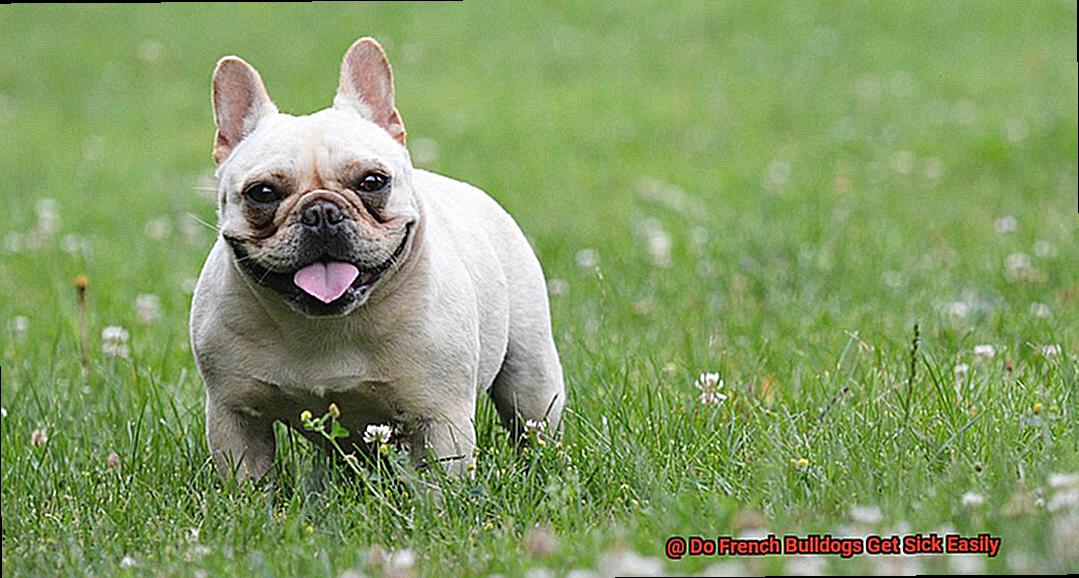Do French Bulldogs Get Sick Easily?
The French Bulldog – a breed that has stolen hearts worldwide with their adorable squishy faces and playful personalities. But here’s the thing: there’s a misconception floating around that these little cuties are fragile creatures, constantly battling illness. Well, let me set the record straight. While French Bulldogs can have their fair share of health issues, they’re not any more prone to getting sick than other breeds. In fact, with some extra care and attention, you can ensure your Frenchie lives a long and healthy life.
Now, don’t get me wrong. French Bulldogs do have some unique physical traits that might put them at risk for certain health problems. Their compact bodies and those oh-so-cute snub noses can sometimes lead to respiratory issues and allergies. And let’s not forget about their sensitive skin and those precious little joints that need some extra TLC. But fear not. By understanding these potential risks and taking preventative measures, you can keep your furry friend in tip-top shape.
In this blog post, we’ll dive deep into the world of French Bulldog health. We’ll explore common ailments like respiratory problems, allergies that make them itch like crazy, skin conditions that make them look less fabulous than usual, and joint disorders that might slow down their zoomies just a tad bit. Armed with knowledge and armed with love for your Frenchie companion, you’ll be ready to conquer any health hurdle that comes your way.
So buckle up, fellow Frenchie enthusiasts. We’re about to debunk some myths surrounding our beloved four-legged friends’ susceptibility to illnesses. Get ready to become an expert on all things French Bulldog health because together, we’ll ensure our pups live their best lives – sniffing butts at the park, stealing socks from our laundry piles, and showering us with endless love (and maybe a few slobbery kisses). Let’s get started.
The Brachycephalic Structure of French Bulldogs
Contents
- 1 The Brachycephalic Structure of French Bulldogs
- 2 Common Health Concerns for French Bulldogs
- 3 Allergies in French Bulldogs
- 4 Genetic Conditions in French Bulldogs
- 5 Joint Issues in French Bulldogs
- 6 How to Manage and Prevent Health Problems in French Bulldogs
- 7 Responsible Breeding Practices for French Bulldogs
- 8 A Healthy Lifestyle for Your French Bulldog
- 9 Conclusion
French Bulldogs are beloved for their adorable appearance, characterized by their unique brachycephalic structure. However, this distinctive head shape comes with certain health implications that owners need to be aware of. In this blog post, we will explore the brachycephalic structure of French Bulldogs and discuss the potential health issues associated with it.
Respiratory Issues:
The shortened muzzle and compressed nasal passages of French Bulldogs result in narrowed airways, making it harder for them to breathe properly. This can lead to respiratory problems such as snoring, snorting, and excessive panting. It is important to monitor their breathing and seek veterinary care if any concerning symptoms arise.
Heat Sensitivity:
Due to their compromised respiratory system, French Bulldogs have difficulty regulating their body temperature. They are more prone to overheating, especially in hot weather or during vigorous exercise. It is crucial to provide them with adequate shade, fresh water, and avoid exposing them to extreme temperatures.
Eye Problems:
The prominent and bulging eyes of French Bulldogs are more susceptible to injuries, infections, and irritations. Regular eye examinations by a veterinarian are essential to detect any potential issues early on. Additionally, keeping their eyes clean and free from debris can help prevent infections.
Dental Concerns:
French Bulldogs with a brachycephalic structure often have overcrowded teeth in their shortened jaws. This can lead to misalignment, tooth decay, and gum disease. Regular dental care, including brushing their teeth and regular professional cleanings, is crucial in maintaining their oral health.
Genetic Conditions:
French Bulldogs are predisposed to certain genetic conditions such as Brachycephalic Obstructive Airway Syndrome (BOAS), which affects their ability to breathe properly. Joint issues like hip dysplasia and intervertebral disc disease are also common. Regular veterinary check-ups and screenings can help detect these conditions early and provide appropriate care.
While the brachycephalic structure of French Bulldogs contributes to their unique appearance, it also brings certain health concerns. Responsible ownership, including regular veterinary care, proper nutrition, exercise moderation, and avoiding extreme temperatures, can greatly improve the quality of life for these adorable companions. By understanding and addressing the potential health issues associated with their brachycephalic structure, we can ensure a happy and healthy life for our French Bulldogs.
Common Health Concerns for French Bulldogs
French Bulldogs are beloved companions known for their unique brachycephalic structure and charming personalities. However, this distinctive head shape comes with a few health concerns that owners should be aware of to provide the best care for their furry friends. In this article, we will discuss the seven most common health concerns for French Bulldogs and provide helpful tips on how to manage them.
Brachycephalic Syndrome
French Bulldogs’ flat face and short muzzle can lead to breathing difficulties, known as brachycephalic syndrome. This condition can cause snoring, snorting, and difficulty breathing, especially in hot weather or during exercise. To help your Frenchie breathe easier, keep them cool in warm weather, avoid strenuous activities, and provide plenty of water.
Allergies
French Bulldogs are prone to allergies, which can manifest as itching, skin rashes, and ear infections. They can be allergic to certain foods, environmental allergens like pollen or dust mites, or even grooming products. Identifying and avoiding the allergen is essential for managing allergies in French Bulldogs. Consult with your veterinarian for guidance on diet changes or allergy testing.
Hip Dysplasia
Hip dysplasia is a common concern in many dog breeds, including French Bulldogs. It is a condition where the hip joint does not develop properly, leading to pain and lameness. To reduce the risk of hip dysplasia, provide regular exercise that is low impact but still keeps your Frenchie active. A balanced diet and maintaining a healthy weight are also important.
Eye Problems
French Bulldogs are prone to various eye problems such as cherry eye, cataracts, and corneal ulcers. Regular eye examinations by a veterinarian can help detect and treat these issues early on. Additionally, keeping your Frenchie’s eyes clean and free of debris can help prevent infections.
Spinal Disorders
French Bulldogs can be prone to spinal disorders, including intervertebral disc disease and hemivertebrae. These conditions can cause pain, difficulty walking, and even paralysis. To protect your Frenchie’s spine, avoid activities that put excessive strain on it, such as jumping from heights. Providing proper support and care for French Bulldogs with spinal disorders is crucial for their well-being.
Heat Sensitivity

Due to their brachycephalic structure, French Bulldogs are more susceptible to heatstroke and heat exhaustion. They have a harder time regulating their body temperature, especially in hot and humid weather. To keep your Frenchie safe, provide shade and fresh water at all times, avoid exercising them in extreme heat, and never leave them in a hot car.
Allergies in French Bulldogs
As a self-proclaimed “Frenchie Whisperer,” I’m here to shed some light on a topic that often sneaks up on our precious pups – allergies. Our adorable bat-eared buddies may be prone to allergies, but fear not. With a little know-how and pawsitive vibes, we can help manage these pesky reactions and keep our Frenchies wagging their curly tails.
Types of Allergies:
- Environmental Allergies: Just like us, French Bulldogs can be sensitive to environmental triggers. Pollen, dust mites, mold spores, and even certain cleaning products can send their sensitive snouts into a frenzy. Keep an eye out for itching, redness, sneezing, and watery eyes.
- Food Allergies: Ooh la la. Our French Bulldogs have delicate tummies too. They can develop allergies to ingredients like beef, chicken, dairy products, grains, or artificial additives. Keep an eye out for tummy troubles like diarrhea or vomiting, as well as skin issues such as itching, rashes, or ear infections.
- Medication or Vaccination Reactions: Sacré bleu. Some Frenchies may have adverse reactions to certain medications or vaccinations. Swelling, hives, or difficulty breathing could be signs of an allergic response. Don’t forget to inform your vet about any previous allergic episodes your Frenchie has experienced.
Managing Allergies:
- Detective Work: To solve the allergy mystery, we must identify the culprit. Work closely with your veterinarian to pinpoint the specific allergen causing the reaction. A process of elimination may involve switching up your Frenchie’s diet or removing potential environmental triggers from their surroundings.
- Foodie Makeover: In the case of food allergies, a hypoallergenic diet may be prescribed. Think of it as a haute cuisine makeover. Your vet may recommend a novel protein source and carbohydrate that your Frenchie hasn’t encountered before. This helps determine if certain ingredients are the cause of their symptoms.
- Paw-some Environment: Create an allergen-free oasis for your Frenchie. Regularly clean their living space using pet-safe products, opt for hypoallergenic bedding, and minimize exposure to known allergens. Sometimes, a little TLC can go a long way.
- Medication Magic: In severe cases, your vet may prescribe antihistamines or other medications to alleviate your Frenchie’s symptoms. Don’t worry; these won’t turn your pup into a French mime. They’re simply designed to provide relief and keep those tails wagging.
Genetic Conditions in French Bulldogs
French Bulldogs are undeniably charming with their unique bat-like ears and adorable snorts. However, behind their irresistible cuteness lie certain genetic conditions that can affect their overall health and well-being. In this article, we will explore these conditions and provide valuable insights on how to manage them effectively.
Brachycephalic Airway Syndrome (BAS):
Due to their characteristic short snouts and flat faces, French Bulldogs are prone to BAS. This condition causes narrowed airways, leading to breathing difficulties. Symptoms may include noisy breathing, excessive panting, and reduced exercise tolerance. To manage BAS, it is important to provide a cool and well-ventilated environment, avoid strenuous activities in hot weather, and ensure your Frenchie maintains a healthy weight.
Intervertebral Disc Disease (IVDD):
IVDD is a genetic condition that affects the spinal discs, resulting in degeneration and potential paralysis or loss of coordination. Regular exercise and weight management can help reduce the risk of developing IVDD. Additionally, providing your Frenchie with supportive bedding and avoiding activities that put strain on their back can help minimize the chances of spinal disc issues.
Hip Dysplasia:
Hip dysplasia is a genetic condition that affects the hip joints, causing pain, discomfort, and lameness. While it cannot be fully prevented, maintaining a healthy weight through proper nutrition and regular exercise can alleviate symptoms. Glucosamine supplements may also be beneficial in promoting joint health for French Bulldogs.
Patellar Luxation:
Patellar luxation occurs when the kneecap slips out of its normal position, resulting in pain and difficulty in mobility. This condition can be managed through surgical intervention if necessary. Regular exercise that avoids excessive jumping or rough play can help prevent patellar luxation.
Eye Conditions:
French Bulldogs are prone to various eye conditions, including cherry eye, cataracts, and progressive retinal atrophy (PRA). Regular eye examinations by a veterinarian are essential in detecting these conditions early on. Surgical intervention or ongoing treatment may be necessary to preserve your Frenchie’s vision.
Skin Allergies and Dermatitis:
Skin allergies and dermatitis are common genetic conditions in French Bulldogs, often resulting in itching, rashes, hair loss, and skin infections. Identifying and avoiding potential allergens, such as certain foods or environmental triggers, is crucial. Regular bathing with hypoallergenic shampoos and utilizing appropriate skincare products can also help manage these conditions.
Joint Issues in French Bulldogs
Understanding these conditions and taking preventive measures can significantly improve your French Bulldog’s quality of life. In this article, we will explore the common joint issues French Bulldogs are prone to and provide you with practical tips on how to minimize their occurrence.
Hip Dysplasia:
Hip dysplasia is a common joint issue in French Bulldogs. This condition occurs when the hip joint doesn’t develop properly, leading to instability and inflammation. To minimize the risk of hip dysplasia:
- Choose a reputable breeder who performs health screenings on their breeding dogs.
- Provide regular exercise that is low-impact and avoids excessive jumping or rough play.
- Maintain a healthy weight to reduce stress on the joints.
- Consider using joint supplements recommended by your veterinarian.
Patellar Luxation:
Patellar luxation, or kneecap dislocation, is another joint issue that can affect French Bulldogs. To prevent patellar luxation:
- Avoid excessive jumping or activities that put strain on the knees.
- Keep your French Bulldog at a healthy weight to reduce stress on the joints.
- Regularly check your dog’s knees for any signs of lameness or discomfort.
- Consult with your veterinarian if you notice any abnormality.
Intervertebral Disc Disease (IVDD):
French Bulldogs are also prone to IVDD, a condition that affects the spinal discs and can cause pain, weakness, and even paralysis if left untreated. To protect your French Bulldog’s spine:
- Avoid activities that involve excessive jumping or twisting of the back.
- Use supportive bedding to provide comfortable rest for your dog’s spine.
- If your French Bulldog shows signs of back pain or weakness, seek veterinary attention promptly.
Being proactive and knowledgeable about joint issues in French Bulldogs is essential for maintaining their overall health and well-being. By following preventive measures, monitoring your dog’s behavior, and seeking veterinary care when needed, you can help your French Bulldog enjoy a happy, active, and pain-free life.
Remember, responsible ownership includes regular veterinary check-ups, maintaining a healthy weight, and providing appropriate exercise and care tailored to your French Bulldog’s individual needs.
Expert Tip: Consult with a veterinarian who specializes in orthopedics or has experience with French Bulldogs to ensure the best possible care for your furry friend.
How to Manage and Prevent Health Problems in French Bulldogs
French Bulldogs are lovable and popular pets known for their distinctive appearance and affectionate nature. However, they can be prone to certain health problems. By taking proactive measures, you can help manage and prevent these issues, allowing your French Bulldog to live a long and healthy life.
Prioritize Respiratory Health:
One of the most common health concerns in French Bulldogs is respiratory difficulty due to their brachycephalic (short-faced) structure. To keep their airways clear, avoid exposing them to extreme temperatures and limit strenuous exercise in hot weather. Additionally, consider using a harness instead of a collar to reduce pressure on the neck and throat.
Maintain a Healthy Weight:
Like many dogs, French Bulldogs have a tendency to gain weight easily. Obesity can lead to joint problems, worsen respiratory issues, and increase the risk of other health conditions. Provide a balanced diet with appropriate portion sizes and avoid overfeeding. Regular exercise is essential as well, but be mindful not to overexert them, especially in hot weather.
Combat Skin Allergies:
French Bulldogs are prone to various skin allergies that can cause itching, redness, and discomfort. Regular grooming is crucial to keep their skin clean and minimize allergens. Use hypoallergenic shampoos and consult with your veterinarian if your Frenchie shows signs of allergies or persistent skin irritation.
Protect Their Eyes:
French Bulldogs are susceptible to eye conditions such as cherry eye and corneal ulcers. Protect their eyes from harsh sunlight and wind by providing shade when outdoors. Regular eye exams by a veterinarian are important for early detection and treatment of any issues.
Prevent Spinal Disorders:
Intervertebral disc disease (IVDD) is a common spinal disorder in French Bulldogs that can cause pain and even paralysis. Avoid activities that strain their spine, such as jumping from heights or engaging in rough play. Provide a comfortable and supportive bed for them to rest on.
Responsible Breeding Practices for French Bulldogs
French Bulldogs are popular and beloved pets known for their adorable looks and affectionate nature. However, to ensure the long-term health and well-being of this breed, responsible breeding practices are essential. In this blog post, we will discuss the key steps breeders should take to promote the health of French Bulldogs and improve the breed.
Health Screening:
Responsible breeders prioritize the health of their breeding dogs by conducting thorough health screenings. This includes genetic testing to identify potential carriers of hereditary diseases such as brachycephalic airway syndrome, hip dysplasia, patellar luxation, and spinal disorders. By selecting breeding pairs that are free from these conditions, breeders can reduce the risk of passing them on to future generations.
Conformation and Structure:
Breeders should also pay attention to the conformation and structure of French Bulldogs. It is important to avoid exaggerated physical features that can contribute to health problems. Excessive wrinkles, short muzzles, and narrow nostrils can lead to respiratory difficulties. By selecting dogs with a balanced structure and promoting healthier physical characteristics, breeders can help address these issues.
Proper Nutrition and Healthcare:
To support the overall health of breeding dogs, responsible breeders provide a well-balanced diet that meets their nutritional needs. Regular veterinary check-ups, vaccinations, and parasite prevention treatments are also essential. By maintaining optimal health in breeding dogs, breeders can increase the chances of producing healthy puppies.
Breeding with Purpose:
Responsible breeders have a clear goal in mind: to improve the breed rather than solely focusing on financial gain. They carefully select breeding pairs based on temperament, sound structure, and overall health. This ensures that puppies inherit desirable traits and reduces the risk of hereditary diseases.
Maternal Care:
The well-being of the mother is crucial during the breeding process. Responsible breeders allow sufficient time between pregnancies for the mother to fully recover. Overbreeding can lead to complications and long-term health issues for the mother. By prioritizing maternal care, breeders can ensure the health and happiness of both the mother and her offspring.
Transparency and Support:
Ethical breeders are transparent about the health and genetic history of their breeding dogs. They provide potential buyers with all relevant information and documentation, including health clearances, genetic test results, and any known health issues in the bloodline. Additionally, responsible breeders offer ongoing support to new owners, ensuring a smooth transition for the puppies into their new homes.
A Healthy Lifestyle for Your French Bulldog
French Bulldogs are known for their compact size, adorable faces, and playful personalities. But did you know that they are also prone to certain health issues? That’s why it’s crucial to maintain a healthy lifestyle for your furry friend. In this article, we will explore some key tips and tricks to keep your French Bulldog in tip-top shape.
- Get Moving: Regular exercise is essential for your French Bulldog’s overall well-being. However, their short-nosed structure can make it challenging for them to breathe during intense physical activities. Opt for moderate exercise like daily walks or play sessions in a controlled environment. This will help keep them fit and happy without putting too much strain on their respiratory system.
- Watch Their Diet: French Bulldogs have a tendency to gain weight, so it’s important to feed them a balanced and nutritious diet. Choose high-quality dog food that is low in fat and rich in protein. Consult with your veterinarian to determine the specific dietary needs of your French Bulldog based on their age and size.
- Vet Visits Matter: Regular check-ups with your veterinarian are crucial for monitoring the health of your French Bulldog. These visits allow the vet to detect any potential health issues early on and provide appropriate treatment. Make sure to stay up to date with vaccinations and preventive medications for parasites like fleas and ticks.
- Don’t Forget Dental Care: Dental hygiene is often overlooked but plays a vital role in your French Bulldog’s overall health. They are prone to dental problems like gum disease and tooth decay. Regularly brush their teeth and provide dental treats approved by your veterinarian to keep their pearly whites in top shape.
- Clean and Safe Environment: Maintaining a clean and safe living environment is essential for the overall well-being of your French Bulldog. Clean their living area regularly, provide fresh water, and avoid exposing them to harmful chemicals or toxins. This will help prevent illnesses and allergies.
- Rest and Relaxation: French Bulldogs may have difficulty regulating their body temperature due to their short noses. Ensure they have a comfortable and cool resting place where they can relax and unwind. Giving them plenty of rest is vital for their overall health and happiness.
By following these tips, you can help your French Bulldog lead a healthy and fulfilling life. Remember, a little effort goes a long way when it comes to your furry friend’s well-being. So, let’s wag our tails and embark on this journey towards a healthier lifestyle for our French Bulldogs.
Conclusion
French bulldogs have a reputation for being prone to certain health issues. However, it is important to note that not all French bulldogs will experience these problems. With proper care and attention, their susceptibility to illness can be minimized.
Like any breed, French bulldogs can be affected by genetic conditions such as hip dysplasia and brachycephalic syndrome. These conditions can cause discomfort and require medical intervention. Additionally, their unique physical characteristics, such as their short snouts and compact bodies, make them more susceptible to respiratory issues and overheating.
However, it is crucial to remember that not every French bulldog will develop these health problems. By providing them with a balanced diet, regular exercise, and routine veterinary check-ups, you can help keep your furry friend in good health.
Furthermore, early socialization and training are essential for French bulldogs to prevent behavioral issues that may arise from stress or anxiety. Ensuring they have a safe and enriching environment will contribute to their overall well-being.
In conclusion, while French bulldogs may have a higher likelihood of certain health concerns compared to other breeds, it does not mean they are destined for constant sickness.




